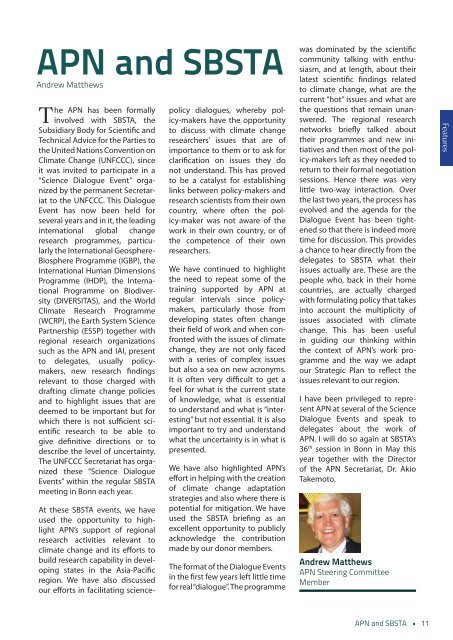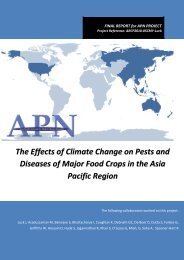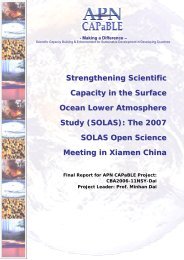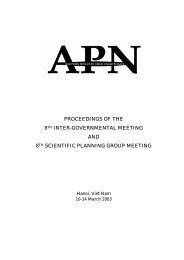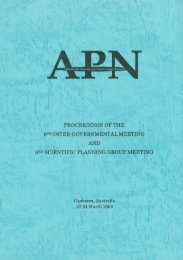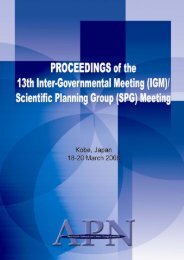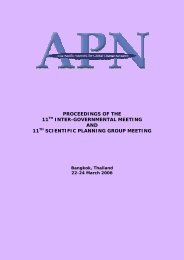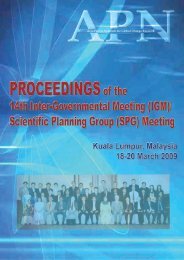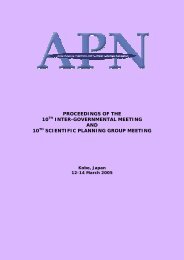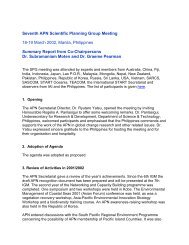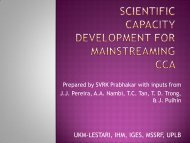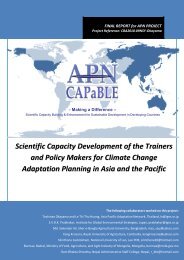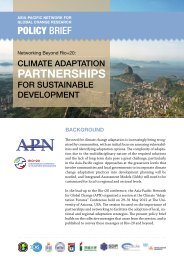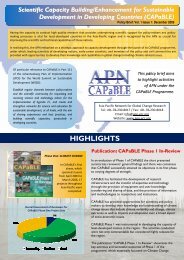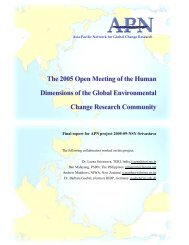APN Newsletter - Asia-Pacific Network for Global Change Research
APN Newsletter - Asia-Pacific Network for Global Change Research
APN Newsletter - Asia-Pacific Network for Global Change Research
Create successful ePaper yourself
Turn your PDF publications into a flip-book with our unique Google optimized e-Paper software.
<strong>APN</strong> and SBSTA<br />
Andrew Matthews<br />
The <strong>APN</strong> has been <strong>for</strong>mally<br />
involved with SBSTA, the<br />
Subsidiary Body <strong>for</strong> Scientific and<br />
Technical Advice <strong>for</strong> the Parties to<br />
the United Nations Convention on<br />
Climate <strong>Change</strong> (UNFCCC), since<br />
it was invited to participate in a<br />
“Science Dialogue Event” organized<br />
by the permanent Secretariat<br />
to the UNFCCC. This Dialogue<br />
Event has now been held <strong>for</strong><br />
several years and in it, the leading<br />
international global change<br />
research programmes, particularly<br />
the International Geosphere-<br />
Biosphere Programme (IGBP), the<br />
International Human Dimensions<br />
Programme (IHDP), the International<br />
Programme on Biodiversity<br />
(DIVERSITAS), and the World<br />
Climate <strong>Research</strong> Programme<br />
(WCRP), the Earth System Science<br />
Partnership (ESSP) together with<br />
regional research organizations<br />
such as the <strong>APN</strong> and IAI, present<br />
to delegates, usually policymakers,<br />
new research findings<br />
relevant to those charged with<br />
drafting climate change policies<br />
and to highlight issues that are<br />
deemed to be important but <strong>for</strong><br />
which there is not sufficient scientific<br />
research to be able to<br />
give definitive directions or to<br />
describe the level of uncertainty.<br />
The UNFCCC Secretariat has organized<br />
these “Science Dialogue<br />
Events” within the regular SBSTA<br />
meeting in Bonn each year.<br />
At these SBSTA events, we have<br />
used the opportunity to highlight<br />
<strong>APN</strong>’s support of regional<br />
research activities relevant to<br />
climate change and its ef<strong>for</strong>ts to<br />
build research capability in developing<br />
states in the <strong>Asia</strong>-<strong>Pacific</strong><br />
region. We have also discussed<br />
our ef<strong>for</strong>ts in facilitating science-<br />
policy dialogues, whereby policy-makers<br />
have the opportunity<br />
to discuss with climate change<br />
researchers’ issues that are of<br />
importance to them or to ask <strong>for</strong><br />
clarification on issues they do<br />
not understand. This has proved<br />
to be a catalyst <strong>for</strong> establishing<br />
links between policy-makers and<br />
research scientists from their own<br />
country, where often the policy-maker<br />
was not aware of the<br />
work in their own country, or of<br />
the competence of their own<br />
researchers.<br />
We have continued to highlight<br />
the need to repeat some of the<br />
training supported by <strong>APN</strong> at<br />
regular intervals since policymakers,<br />
particularly those from<br />
developing states often change<br />
their field of work and when confronted<br />
with the issues of climate<br />
change, they are not only faced<br />
with a series of complex issues<br />
but also a sea on new acronyms.<br />
It is often very difficult to get a<br />
feel <strong>for</strong> what is the current state<br />
of knowledge, what is essential<br />
to understand and what is “interesting”<br />
but not essential. It is also<br />
important to try and understand<br />
what the uncertainty is in what is<br />
presented.<br />
We have also highlighted <strong>APN</strong>’s<br />
ef<strong>for</strong>t in helping with the creation<br />
of climate change adaptation<br />
strategies and also where there is<br />
potential <strong>for</strong> mitigation. We have<br />
used the SBSTA briefing as an<br />
excellent opportunity to publicly<br />
acknowledge the contribution<br />
made by our donor members.<br />
The <strong>for</strong>mat of the Dialogue Events<br />
in the first few years left little time<br />
<strong>for</strong> real “dialogue”. The programme<br />
was dominated by the scientific<br />
community talking with enthusiasm,<br />
and at length, about their<br />
latest scientific findings related<br />
to climate change, what are the<br />
current “hot” issues and what are<br />
the questions that remain unanswered.<br />
The regional research<br />
networks briefly talked about<br />
their programmes and new initiatives<br />
and then most of the policy-makers<br />
left as they needed to<br />
return to their <strong>for</strong>mal negotiation<br />
sessions. Hence there was very<br />
little two-way interaction. Over<br />
the last two years, the process has<br />
evolved and the agenda <strong>for</strong> the<br />
Dialogue Event has been tightened<br />
so that there is indeed more<br />
time <strong>for</strong> discussion. This provides<br />
a chance to hear directly from the<br />
delegates to SBSTA what their<br />
issues actually are. These are the<br />
people who, back in their home<br />
countries, are actually charged<br />
with <strong>for</strong>mulating policy that takes<br />
into account the multiplicity of<br />
issues associated with climate<br />
change. This has been useful<br />
in guiding our thinking within<br />
the context of <strong>APN</strong>’s work programme<br />
and the way we adapt<br />
our Strategic Plan to reflect the<br />
issues relevant to our region.<br />
I have been privileged to represent<br />
<strong>APN</strong> at several of the Science<br />
Dialogue Events and speak to<br />
delegates about the work of<br />
<strong>APN</strong>. I will do so again at SBSTA’s<br />
36 th session in Bonn in May this<br />
year together with the Director<br />
of the <strong>APN</strong> Secretariat, Dr. Akio<br />
Takemoto.<br />
Andrew Matthews<br />
<strong>APN</strong> Steering Committee<br />
Member<br />
<strong>APN</strong> and SBSTA •<br />
11<br />
Features


